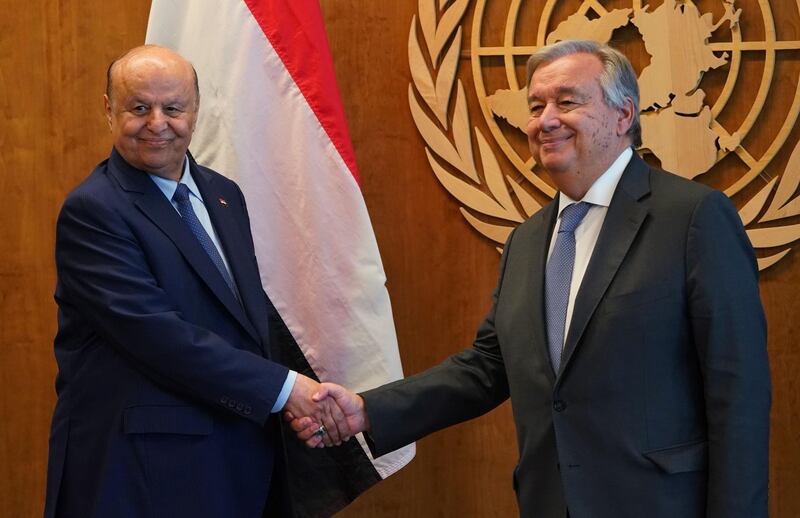Yemen’s former Prime Minister Khaled Bahah said on Monday that there was still room for a political settlement to the country’s nearly four-year-long conflict but warned Houthi rebels that they would lose all credibility among global powers if they derail peace talks scheduled for the end of the year.
The Houthi movement obstructed negotiations over a settlement to the longstanding conflict in September, after their delegation failed to participate in talks in Geneva led by UN envoy Martin Griffiths, who has vowed to press ahead with diplomacy despite the snag. Rebels, at the time, refused to leave Sanaa, the rebel-held Yemeni capital, insisting on a series of last-minute demands, including UN guarantees their plane would not have to stop in Djibouti for inspection by the Saudi-led coalition.
"If they delay the peace process [again], then they will lose everything and the international community will deal with them as a terrorist organisation just like ISIS," Mr Bahah told The National on the sidelines of the Abu Dhabi Strategic Debate (ADSD) conference.
“They will be categorised as a terrorist group because of the chaos and destruction they have caused in Yemen,” Mr Bahah said, adding that there was still an opportunity for a political solution.
Mr Griffiths, who is due to brief the Security Council on November 16, is trying to salvage peace talks that collapsed in September. He said in a statement earlier this month that he hoped to bring the parties to the negotiating table within a month.
However, a UN spokesman said negotiations will be delayed until the end of year, in order to clear any potential challenges and boost chances for success.
The announced delay comes after fighting between Houthi militants and government forces around the strategic port city of Hodeidah intensified in the beginning of November.
An aide to Mr Griffiths on Friday said work to re-launch the political process was proceeding as planned.
"We are in constant consultation with the parties to finalise the logistical arrangements for holding the talks. We are committed to convening the talks as soon as those arrangements are finalised," said the aide.
Mr Bahah said that he is optimistic about upcoming talks, considering that a preliminary framework for a potential solution is already in place.
“The environment for talks is positive considering that we have a draft constitution that the Houthis have agreed to and signed three years ago,” he said. “We won’t start all over again, even if the Houthis came to the negotiation table…we have (already) agreed on a political outline,” he said.
If rebels fail to show up, Mr Bahah said that the Yemeni government has drafted a proposal for a political settlement that will be unilaterally presented to the UN. However, he called on all sides of the conflict to ensure that Houthi rebels do participate in the next round of talks. Their absence, he said, would botch attempts to broker a solution to the conflict.
The former prime minister also said that the Yemeni government is ready to discuss “confidence-building measures” that aim to enhance trust between the warring parties. Those include, freeing prisoners, supporting the central bank, reopening airports and dispatching UN observers to the Hodeidah port to prevent arms smuggling, Mr Bahah said.
He said that the Yemeni government has already discussed some, but not all, of these measures. He suggested, however, that discussions over confidence building measures should be kept private because it could take months if not years before an agreement is reached on that front.
“We don’t want people to lose hope,” he said.
In order to enhance public confidence in the Yemen peace process, Bahah said that developments in peace talks should be made public and available.
The Yemeni conflict began in 2015 when an Arab coalition took on Houthi rebels who had overthrown the internationally recognised president. The conflict has killed thousands and created a humanitarian crisis for the hundreds of thousands of Yemenis still trapped in the country.





